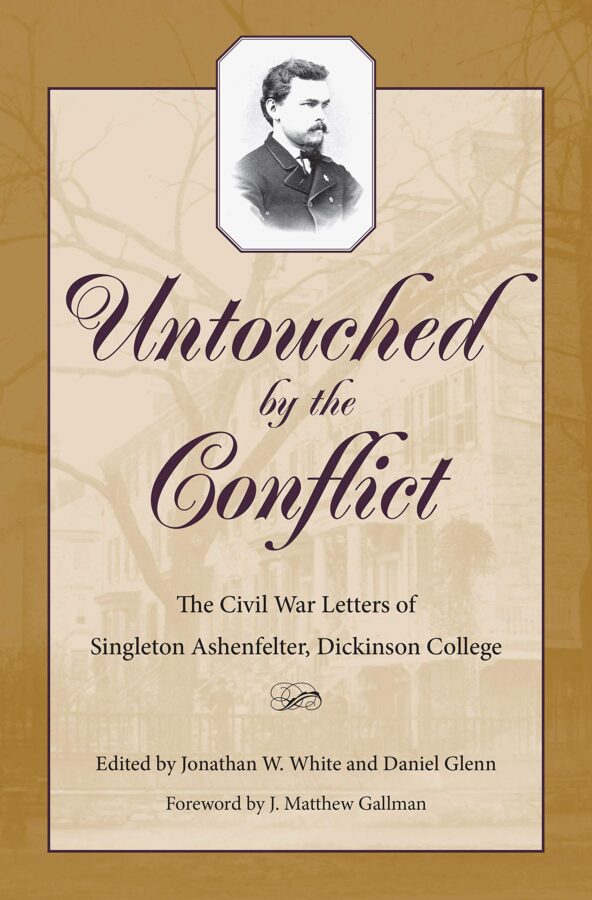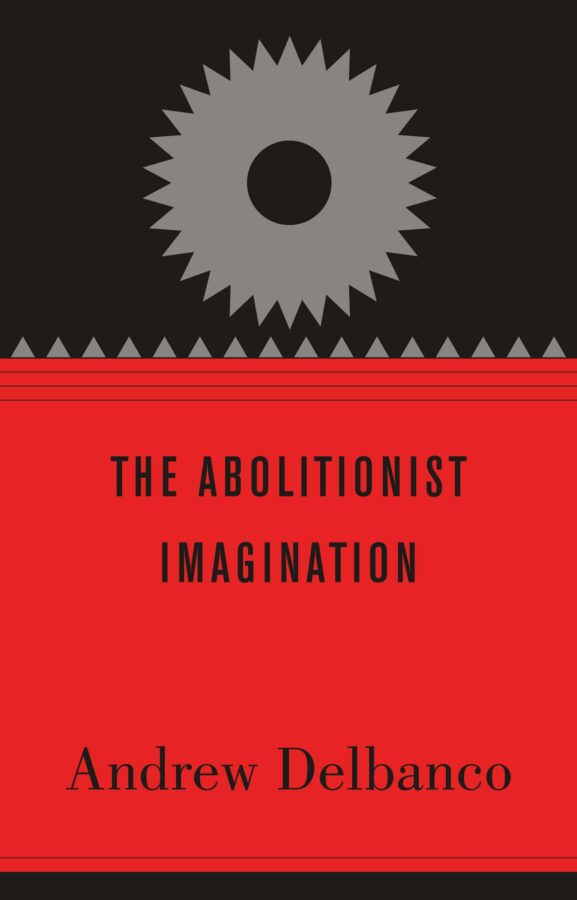Untouched by the Conflict: The Civil War Letters of Singleton Ashenfelter, Dickinson College edited by Jonathan W. White and Daniel Glenn. Kent State University Press, 2019. Cloth, ISBN: 978-1-60635-383-7. $29.95.
 More than two million young men left their civilian lives, donned blue woolen uniforms, shouldered arms, and served in the Union Army during the Civil War. Many Dickinson College alumni and students enlisted and served in various capacities on both sides during the conflict. Singleton Ashenfelter did none of these things. Why, then, should readers interested in the Civil War read the unabridged letters written by this middle-class college student to his best friend, Samuel W. Pennypacker, between 1862-1865?
More than two million young men left their civilian lives, donned blue woolen uniforms, shouldered arms, and served in the Union Army during the Civil War. Many Dickinson College alumni and students enlisted and served in various capacities on both sides during the conflict. Singleton Ashenfelter did none of these things. Why, then, should readers interested in the Civil War read the unabridged letters written by this middle-class college student to his best friend, Samuel W. Pennypacker, between 1862-1865?
Editors Jonathan W. White and Daniel Glenn offer one reason. “Roughly 60 percent of white military-age men in the North — some three million people — did not enlist to fight in the Civil War,” they note. J. Matthew Gallman, widely acknowledged as the reigning dean of Northern home front studies, offers still another reason in his Foreword. He opines that, “Ashenfelter’s letters offer a marvelous window into the daily life of the mid-nineteenth-century college student.” Put the two together and these letters, again according to Gallman, “illustrates a larger truth. In the Civil War North, many aspects of life carried on almost undisturbed by events on distant battlefields.” Most of Ashenfelter’s letters support the veracity of Gallman’s observation.
So what did Ashenfelter write about to his best chum “Penny,” and what do they tell us about ideas and issues that percolated through mid-century Northern society? Not surprisingly, Ashenfelter commented on the classes he took, the professors he admired or disliked, and the books he did or did not read. His description of Herman M. Johnson, the college president, typifies the opinionated observations that would characterize many of Ashenfelter’s more colorful depictions of college life. “He is short, lean, dried-up and sneaking looking personage as ever I set my eyes on. Nor does he character give lie to his face…”. Other members of the faculty “are all perfect gentlemen, and each looks as if he understands his own department and they do.”
Commenting on the novel Gil Blas by Alain Rene Lesage in a November 1862 letter, Ashenfelter concludes, “it may be a very excellent work when printed in the French language, yet when rendered into English it consists of many very good ideas, thrown together, with a miserable lack of composition. I read it merely for the sake of curiosity.” A year later, Ashenfelter’s reading habits and analysis seem to have become a bit more sophisticated. He asks Sam [Pennypacker] if he knew the work of Ike Marvel—the pen name of Donald Grant Mitchell—and informs him that, “I have read ‘Reveries of a Bachelor,’ & I admire it very much. There is, published, a work by the same author, called ‘Dream Life,’ which contains as true an expression of the sentiments of our younger, of our present days, as I have ever met.” Sounding more mature and introspective, Ashenfelter admits, “I partially understand now what an educated man must be; & if my course at College suffices to teach me my own ignorance, it will have done enough — the time will have been well spent.”
About organized religion, Ashenfelter admits to no ignorance. He will have none of it. At a time when the Second Great Awakening was sweeping through both the Union and Confederate armies, Ashenfelter shows himself to be swimming against a surging tide. He uses a March 1864 letter to explain why “my conscience will not permit me to enter a building devoted to worship. It will not permit me to take particular pains and become a regular listener to what I do not believe.” Challenging his friend, a regular church goer, Ashenfelter declares, “What would you say to denying, or at least refusing to admit the existence of a God. At that point I have finally arrived.” He explains how, for him, reason has triumphed over faith, admitting, “Hard as it was to abandon the old impressions, I clung to reason & doubted the truth of the scriptures.” Ashenfelter accepts the ultimate Darwinian analysis of life. “Like all other animals,” he concludes, “we come upon the world in youth, draw a certain number of breaths during life, & are merged into dust after death. I am an utter skeptic in all things.”
Given his rationalistic outlook on life, it should not be surprising that Ashenfelter places himself at the center of his universe. He concludes, “I think whatever contributes of my pleasure is right — all else — wrong…I recognize no Supreme Power & consequently feel I owe no higher duty than to self.” Arguing for the “supremacy of the educated,” Ashenfelter declares that “the responsibility of our present strife lies almost entirely with the mass of uneducated voters — men who exercised the privilege of the elective franchise without even a knowledge of its meaning.” As a consequence, he also admits, “I have come to the conclusion that Universal Suffrage is both wrong and inexpedient.”
Ashenfelter does declare that he is in agreement with one of the strongest reform movements of the day — abstinence from “strong drink.” In a July 1864 letter, he explains “As to drinking itself — I have no apetite [sic] for liquor. I cannot even say that I like its effects.” Describing temptation aplenty, he vows, “Not one drop shall pass my lips from the time I graduate until my dying day.”
In spite of his seeming contentment with self-containment, Ashenfelter repeatedly extols the importance of his connection with Pennypacker. His unabashed ardor for their male friendship borders on the homoerotic, a possibility the editors do not explore. While he repeatedly talks about his relationships with female acquaintances, particularly Annie Euen, and later entered into a successful marriage, fathering five children, Ashenfelter acknowledges that he has no hesitation in “revealing even my most private thoughts.” He insists that he does not flatter his friend “when I tell you that I could open up to you the most secret chambers of my heart. In short you are the only person living, who, with my consent, may know Sing Ashenfelter as well as I do.”
While Ashenfelter writes little about the war, he cannot ignore it completely. One of his pre-college friends was killed in The Wilderness and his brother, George, enlisted served as an officer in the 104th Pennsylvania Infantry. Almost as a lark, Ashenfelter and other Dickinson students enlisted in a Pennsylvania militia unit when Governor Curtain calls for volunteers during Robert E. Lee’s first foray into the North in September 1862. “Spent four days in camp,” he writes. “Began to get used to it. Never liked anything better in my life. Woke up one morning and found myself discharged.”
He left no record of the second Confederate invasion of Pennsylvania in the summer of 1863, even though Carlisle was briefly occupied and some buildings on the college campus were shelled while others were used as a hospital. Nor did he accompany many of his classmates to the dedication of the cemetery in Gettysburg the following November. Still, Ashenfelter called himself a “pro-war abolitionist” and admitted that “the South should be made to understand the she cannot do just as she pleases.”
How to evaluate Ashenfelter’s letters? Are they representative of other young Northern men who remained civilians, or are they merely the coming-of-age saga of one very opinionated youth on the cusp of manhood? Recovering other letter collections from male non-participants in the war will help place Ashenfelter’s correspondence in a broader context. Until then, we must read the letters as a welcome peak into a still mostly hidden world.
Gordon Berg has penned articles and reviews for numerous Civil War publications. He writes from Maryland.
